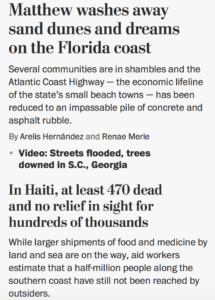 This screenshot, taken earlier this morning, is of the front page of the on-line edition of today’s Washington Post. (The top report is here; the bottom one is here.) The juxtaposition of these two reports of the destruction wrought by hurricane Matthew speaks volumes about the benefits of the economic prosperity made possible by bourgeois dignity.
This screenshot, taken earlier this morning, is of the front page of the on-line edition of today’s Washington Post. (The top report is here; the bottom one is here.) The juxtaposition of these two reports of the destruction wrought by hurricane Matthew speaks volumes about the benefits of the economic prosperity made possible by bourgeois dignity.
In economically unfree Haiti people are desperately poor. They live in flimsy shanty houses. Their roads, bridges, electrical grid, and other infrastructure are primitive by modern American standards. Their supply lines, even in the best of times, are creaky and fragile. As a result, hurricanes and other natural disasters prove to be literally lethal for many such poor people. And large numbers of these poor people who survive live for weeks, months, or perhaps even years after the natural disaster strikes in filthy and miserable conditions that most Americans can’t imagine.
In contrast, in (relatively) economically free America people are much more prosperous. Therefore, hurricanes and other natural disasters are much less lethal and their ill-consequences far less long-lived than in Haiti and other poor countries. In Florida, Matthew, while responsible for a small number of deaths, mostly just washed away dunes and “dreams.” In Haiti, Matthew washed away whole villages and hundreds of lives. Far better that a hurricane destroy my “dream” than that it kill my son.
Yes, yes, yes: much depends, in any particular set of circumstances, on the exact location of a natural- disaster’s striking points. Maybe Matthew did not strike Florida with the same brute force that it unleashed on Haiti. Or maybe it struck Florida in a less populated location than where it struck Haiti. Yes. But make no mistake: all else equal, denizens of rich societies, such as that of the United States, are far safer when natural disasters strike than are denizens of poor societies – and getting safer. ’tis true. (I once offered to put my money where my mouth is on a closely related proposition. The offer remains open.)
Free, innovative, bourgeois markets – contrary to the false assumptions of what Deirdre McCloskey calls “the clerisy” – deliver to ordinary people far more than an abundance of trinkets, playthings, and other amusements. Free, innovative, bourgeois markets deliver cleaner, safer, longer lives – longer lives filled with less pain, less anxiety, less hardship, less tragedy, less ugliness, and less serious disruption.
Put differently – but no less importantly – free, innovative, bourgeois markets, even if they do contribute to global warming, make humans’ environments more pleasant, more robust and resilient, and far safer.



